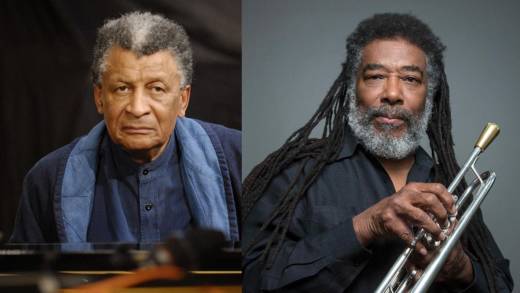Different as they might seem, Smith and Ibrahim both draw direct inspiration from the jazz explorers who introduced new rhythmic and tonal concepts in the late 1950s. At his first Epistles rehearsal last week, Smith tells me in a phone interview, he found that the session covered a lot more than running through tunes. Ibrahim spent part of the time talking about his experiences as a young exile in New York City in the mid-1960s “playing with all the great masters, Cecil Taylor, Ornette Coleman, and Don Cherry,” says Smith, 76.
“I knew he and Don were tight, but to watch the gleam in his eye talking about him was wonderful. It inspired me so much that this morning I started working on a composition for trumpet and piano, a psychological portrait of Ibrahim. I left the rehearsal yesterday with beautiful energy and this morning that energy gave me a gift.”
A thoughtful and strikingly insightful portraitist, Smith often reveals unexpected facets of his fellow artists, like on last year’s Solo: Reflections and Meditations on Monk (TUM Records). But over the past decade, he’s enjoyed a late-career burst of activity working on expansive soundscapes that evoke entire geographical regions, like 2014’s The Great Lakes Suite (TUM Records). His music has also meditated on complex historical events, most notably 2012’s epic Pulitzer Prize finalist Ten Freedom Summers (Cuneiform), an orchestral four-disc project inspired by the civil rights movement.
Like Ibrahim, Smith takes his role as an artist seriously, embracing the idea that “music is not just for entertainment. Music can heal. It creates the conditions for healing, and carries a narrative history and the content of spirituality. The whole idea of music transforming society, and what it does when people listen, those are things that the AACM tapped into reaching back to African music,” Smith said, referring to Chicago’s seminal Association for the Advancement of Creative Musicians, which he joined in 1967.
As for Ibrahim, the struggle for freedom has been a central motif in his music since the start, when he was a conspicuously gifted young pianist who performed as Dollar Brand. Joined by Masekela, he launched the Jazz Epistles, which recorded the first jazz album by black South African musicians. They played original arrangements of tunes by Dizzy Gillespie, Thelonious Monk, Duke Ellington and Fats Waller, as well as originals that blended bebop and mbaqanga, a melodically lilting style that grew out of a street-corner Zulu vocal tradition.
The group was wildly popular, but the apartheid government’s accelerating crackdown on political dissent in 1960 made the situation untenable for musicians, as any gatherings of more than 10 blacks were banned. Ibrahim and his future wife, jazz vocalist Sathima Bea Benjamin, fled first to Europe. In Switzerland they famously connected with Ellington, who was so taken with the self-possessed young pianist that he flew the group to Paris the next day and produced the album Duke Ellington Presents The Dollar Brand Trio (Reprise).
Ibrahim’s tribute to the Jazz Epistles is built on his longtime band Ekaya, featuring Noah Jackson on bass and cello, drummer Will Terrill, Cleave Guyton Jr. on alto sax, flute and clarinet, tenor saxophonist Lance Bryant, baritone saxophonist Marshall McDonald, and Andrae Murchison on trombone and trumpet. In many ways, Smith’s volatile trumpet is the wild card in a group steeped in the pianist’s serene, lapidary compositions.
“There’s always the perception that the music is simple, but it’s very complex, and very, very difficult to play,” Ibrahim told me in an interview several years ago. “We are the first generation of jazz improvisors in the African tradition. In order to do that, you need serenity. It’s not a question of taking bebop lines and adding it on top of our music. We had to develop a vocabulary, and we’re still developing it.”
With Wadada Leo Smith in the mix, Ibrahim’s music and the legacy of the Jazz Epistles is poised for another evolutionary leap.

The Jazz Epistles, with Abdullah Ibrahim and Wadada Leo Smith, perform Feb. 22–Feb. 25 at the SFJAZZ Center in San Francisco. Details here.



